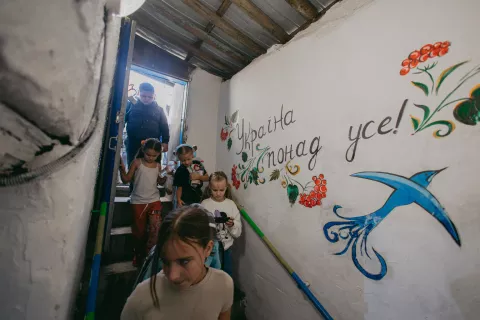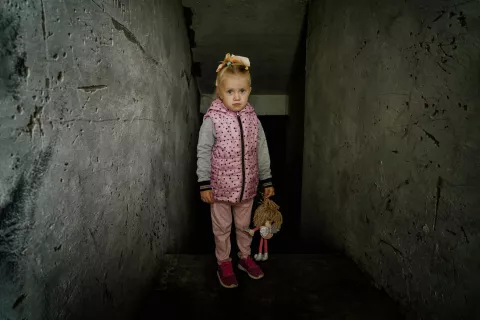Some days I just have to listen: A family therapist works with Syrian refugees in Turkey
What it's like working on the psychological front line of the worst humanitarian crisis since World War II

IZMIR, Turkey, 16 May 2017 – As a family therapist, Zeynep Kapisiz regularly deals with anger, depression, fear and many pleas for help. Some days she feels overwhelmed. The problems she is trying to solve can seem intractable.
“I’ve learned that some days I just have to listen,” Zeynep says. “I can’t pay a family’s rent or find money for food. So we focus on learning how to take deep breaths and we just talk.”
Zeynep works with Syrian refugees, mostly women and their children living in Izmir, Turkey’s third largest city.
The Syrian refugee crisis, now in its seventh year, remains the worst humanitarian crisis since World War II. Turkey hosts the largest number of refugees in the world, with nearly 3 million registered Syrian refugees alone. Of these, over 1.3 million are children. In Izmir, there are just under 110,000 registered Syrian refugees.
A conflict’s most painful scars are often the hidden ones. It is the Syrian children that bear the heaviest burden. After living through years of violence and suffering, they are more likely to develop psychological disorders, become victims of violence, be forced into child marriages and recruited into armed groups.
Zeynep works on the psychological front line of this conflict. She divides her day between a sparse but modern looking office where she meets as many as five patients a day and a cozy playroom where she spends time playing with children, both part of a child and family support centre run by the Association for Solidarity for Asylum Seekers and Migrants (ASAM) in partnership with UNICEF and funded by the European Union. The ASAM centre provides a one-stop, comprehensive set of services for refugees including primary health and nutrition services, life skill and parenting trainings, Turkish lessons, community outreach and psychosocial support.
Zeynep, who is studying for a Masters degree in psychology at Izmir’s Ege University, faces many hurdles. Psychological help, in particular family therapy, is not commonplace in Syrian culture. Fathers are rarely involved in the visit and mothers can be nervous and uncomfortable sharing information with Zeynep in front of the Syrian assistant who works as her Arabic translator. The pervasive belief is that family problems should be kept secret.
“Most come to me first for help with symptoms such as bed-wetting, physical ticks, speech disorders and aggressive behavior,” Zeynep explains. “My job is not only to treat these visible problems but to address the trauma underneath and explain this to the parent.”

Zeynep uses the empty playroom to catch up on her work. The ASAM centre provides a one-stop, comprehensive set of services for refugees including primary health and nutrition services, life skill and parenting trainings, Turkish lessons, community outreach and psychosocial support.
Anger is a frequent manifestation of trauma. For Zeynep, another challenge is how to address her patients’ traditional parenting style where corporeal punishment is common at home as well as in school. Working with mothers, she talks about children’s developmental milestones and notes their history from birth to the present. They focus on how to identify verbal and physical abuse, discrimination and bullying.
With the children, she teaches deep breathing techniques to help them relax and manage anger issues.
“Imagine you are filling a bowl with air or if you are angry imagine squeezing two lemons in your hands,” she tells them.
Though her job is challenging, Zeynep remains inspired by the tenacity and love of others. There was the father who was dedicated to trying to find ways to help his son with Down syndrome and the mother devoted to helping her nine-year-old son overcome both the stuttering and the anger he had developed during the conflict. Her longest patient, a 13-year-old girl, who developed serious visible ticks after witnessing a bomb explosion, is doing better after weekly therapy and medication.
“I know it’s not realistic to feel satisfaction for all my cases,” Zeynep says. “But I do feel satisfaction especially with the children.”
In partnership with children
ASAM, in collaboration with UNICEF, and with funding from the European Union Trust Fund supports refugees and asylum seekers in meeting their basic and social protection needs. The CFSCs established in partnership with UNICEF as part of the Syrian response effort, are a “one-stop” shop for beneficiaries and provide a series of child-friendly and child-centered services.



